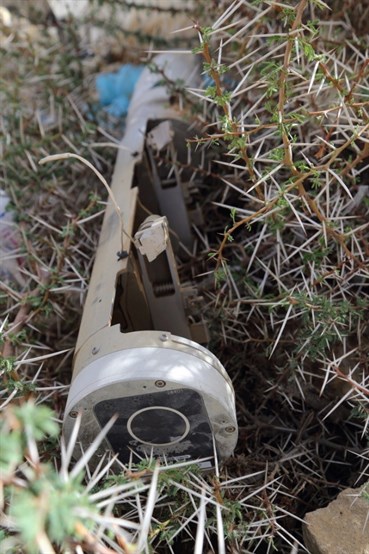14 February 2016
US Cluster Bombs Repeatedly Used by Saudi-Led Coalition
Bombings in civilian areas flout US export law
Update 15 February 2016: The New York Times, "New Report of U.S.-Made Cluster Bomb Use by Saudis in Yemen", by Rick Gladstone, print edition page A4
Original post 14 February 2016:
The coalition led by Saudi Arabia is using US-made cluster munitions to bomb civilian areas in Yemen, causing civilian casualties.
Since 26 March 2015, the coalition has been conducting a military operation in Yemen against Houthi forces. Field research by Human Rights Watch, Amnesty International, and the United Nations, interviews with witnesses and victims, and photographs and video evidence confirm the use of cluster munitions in Yemen.

An expended BLU-108 canister from a CBU-105 Sensor Fuzed Weapon found in the al-Amar area of al-Safraa, Saada governorate, in northern Yemen on April 27. © 2015 Ole Solvang, Human Rights Watch
The Cluster Munition Coalition condemns these attacks and calls on the Saudi-led coalition to stop using cluster munitions. All states involved should join the 2008 Convention on Cluster Munitions.
One type of air-dropped cluster munition being used is the CBU-105 Sensor Fuzed Weapon manufactured by Textron Systems Corporation, supplied in recent years by the United States to Saudi Arabia and to the United Arab Emirates. CBU-105 Sensor Fuzed Weapons are the only cluster munitions currently exported by the US.
US export law prohibits recipients of cluster munitions from using them in populated areas, as the Saudi coalition has been doing. In addition, US export law only allows the transfer of cluster munitions with a failure rate of less than one percent. However evidence indicates that CBU-2015 Sensor Fuzed Weapons used in Yemen fail to meet that reliability standard.
Recent photographs taken by Human Rights Watch field investigators at one location and photographs received from another location show BLU-108 (the canisters contained within the CBU-105) from separate attacks with their “skeets” or submunitions still attached. This shows a failure to function as intended, leaving behind unexploded submunitions that pose grave risks to the civilian population.
On 16 January 2016 the Cluster Munition Coalition sent a letter urging President Obama to demand that Saudi-led coalition members stop using cluster bombs.
“Sensor Fuzed Weapons are touted by some as the most high tech, reliable cluster munitions in the world, but we have evidence that they are not working the way they are supposed to in Yemen, and have harmed civilians in at least two attacks,” said Steve Goose, Chair of the Cluster Munition Coalition and Arms Director at Human Rights Watch. “The evidence raises serious questions about compliance with US cluster munition policy and export rules.”
The Cluster Munition Coalition urges the United States to review the United States’ 2009 cluster munitions law, and to remove the exception allowing cluster munitions that result in less than one percent unexploded ordnance rate.


